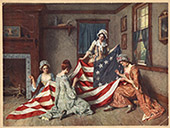Libraries, University of Nebraska-Lincoln
Document Type
Archival Material
Date of this Version
1777
Abstract
ABRAHAM KETELTAS (1732-98) was raised by Protestant parents in New York and New Rochelle, where he spent much of his time among the communities of Huguenots in the area. Becoming fluent in French early on, he later studied theology at Yale, where he earned his degree in 1752, followed by his preacher’s license in 1756. From 1757 until his dismissal in 1760, Keteltas supplied the pulpit of the Presbyterian church in Elizabethtown, New Jersey. He then served as an itinerant preacher to the Dutch and Huguenot parishes in Jamaica and Long Island, New York, where he gained much popular support. By 1776, Keteltas was elected to the Provincial Congress and became such a vociferous defender of the American cause that he feared for reprisals when British troops landed on Long Island. During the Revolution, he served as preacher to a number of Presbyterian churches in Massachusetts and Connecticut until his retirement in 1782. He died in 1798 and was buried on Long Island.
Of his patriotic sermons, three deserve to be singled out. The Religious Soldier (1759), preached to American and British forces in 1759, exhorts his audience to moral conduct in warfare and patriotic service of their country. God Arising And Pleading his People’s Cause (1777) and his Reflections on Extortion (1778) are bold expressions of American Independence.
In the former sermon (here courtesy of the Library of Congress), Keteltas enlists Jehovah of Armies in defense of America’s rights. Drawing on typological parallels from both Testaments, Keteltas demonstrates that God always supports the cause of righteousness, liberty, and self-government, especially where His people are concerned. If God is on the side of His American Israel, Kelteltas prophecies, the British enemy cannot succeed for long. Religion and politics are joined in a bed of patriotism.



Comments
This online electronic text of God Arising and Pleading His People’s Cause is transcribed from the first edition published in 1777 at Newburyport, Massachusetts. The spelling, punctuation, capitalization, and italics of that edition are preserved. The text was prepared by Reiner Smolinski and appeared in his The Kingdom, the Power, & the Glory: The Millennial Impulse in Early American Literature (Dubuque, Iowa: Kendall-Hunt, 1998), pp. 426–440.
Introduction copyright © 1998 Reiner Smolinski.